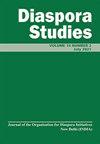重新定位散居地——发展纽带
IF 0.5
Q4 DEMOGRAPHY
引用次数: 0
摘要
自20世纪90年代以来,散居社区越来越被认为是发展的推动者,国家、公民和全球发展团体都渴望利用他们的知识、技能和经济资本。“散居选择”的方法往往植根于新自由主义全球化的话语、实践和产品。然而,在21世纪最近的十年里,这种世界主义遭到了强烈反对。本文推动了对侨民-发展关系的重新定位,以回应新自由主义全球化的当代现实(以及对新自由主义全球化的强烈反对):(重新)边界,欧洲和北美的民族民族主义,本土主义政治和反移民话语。通过后流散的视角来思考流散发展关系中相互联系的地理、复杂的时间性和(种族化的)不平等。本文的结论是,通过后流散透镜,流散与发展的联系可以集中在日常的社会、文化、物质和政治环境以及通过多个地点的经验和归属感上,重新定位这种联系,以推进流散社区的日常社会经济、文化和政治解放。本文章由计算机程序翻译,如有差异,请以英文原文为准。
Re-orienting the Diaspora–Development Nexus
Since the 1990s diasporic communities have increasingly been recognized as agents of development, with states, citizens, and the global development community keen to harness their knowledge, skills, and economic capital. Approaches to the ‘diaspora option’ tend to be rooted in the discourses, practices, and products of neoliberal globalization. Yet the most recent decade of the 21st century has witnessed a backlash against this cosmopolitanism. This paper pushes for a re-orientation of the diaspora-development nexus that looks to respond to the contemporary realities of (and the backlash against) neoliberal globalization: (re)bordering, European and North American ethnonationalism, nativist politics, and anti-migrant discourses. Thinking through a post-diasporic lens foregrounds the interconnected geographies, the complex temporalities, and the (racialized) inequalities within the diaspora–development nexus. The paper concludes that through a post-diasporic lens the diaspora–development nexus can be centred on everyday social, cultural, material, and political circumstances and experiences and feelings of belonging through multiple locales, re-orienting the nexus to advance the everyday socio-economic, cultural, and political liberation of diasporic communities.
求助全文
通过发布文献求助,成功后即可免费获取论文全文。
去求助
来源期刊

Diaspora Studies
DEMOGRAPHY-
CiteScore
1.40
自引率
10.00%
发文量
18
期刊介绍:
Diaspora Studies is the interdisciplinary journal of the Organisation for Diaspora Initiatives (ODI) and is dedicated to publishing academic research on traditional diasporas and international migrants from the perspective of international relations, economics, politics, identity and history. The journal focuses specifically on diasporas and migrants as resources for both home and host countries. The scope of the journal includes the role of diasporas and international migration as important drivers in international relations, in development, and within civil societies. The journal welcomes theoretical and empirical contributions on comparative diasporas and state engagement policies, and aims to further scholarship and debate on emerging global networks and transnational identities. Diaspora Studies publishes: 1. Reviewed research papers 2. Book reviews 3. Conference reports 4. Documents on diaspora policies
 求助内容:
求助内容: 应助结果提醒方式:
应助结果提醒方式:


